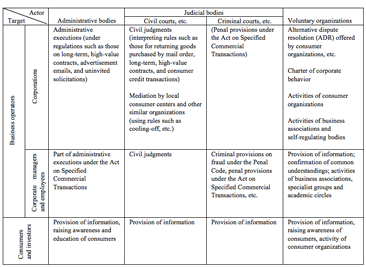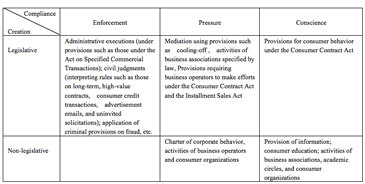Consumption is critical as a source of demand that should support the Japanese economy going forward. Looking at the Japanese economy over the past 20 years in 100 trillion-yen terms, personal consumption accounted for 300 trillion yen out of the nation's gross domestic product (GDP) amounting to 500 trillion yen. The future course of the economy hinges greatly on whose demand will constitute personal consumption hereafter. Suppose that problematic transactions account for 1% of personal consumption, which translates into three trillion yen. Directing half of such transactions to honest business operators would generate revenue in excess of 1.3 trillion yen, or what the government spent on the promotion of science and technology in fiscal 2011 (April 2011-March 2012).
What it takes to enable the consumer market to function properly
It is wished that revenue generated by our consumption be earned by good business operators, who strive to develop new technologies, improve management techniques, and help young people become competent human resources capable of contributing to society. Playing a key role in achieving this end is the consumer market.
In a market where business operators are better off developing the skill of deceiving consumers rather than creating valuable technologies or management techniques, human resources cannot be nurtured and economic development cannot be expected. In contrast, a properly functioning market motivates business operators to make efforts toward delivering value to consumers. Industries grow and develop only when such a market exists.
In order to ensure that the consumer market functions properly, it is necessary to understand and address the problems from a broad perspective. In considering ways to solve the problems involving consumers, we often hear people discuss "whether or not the government should enforce law on companies." Although it is important, it is not the only effective way to ensure proper transactions between consumers and business operators in the actual market.
Actors and targets
First, let us focus on the "government" and "companies" in the aforementioned question. They respectively represent the "actor" and "targets" of the measures taken. In addition to the central government, local governments often act on consumer policy. Either way, they are administrative bodies. Other examples of actors include judicial bodies, which can be classified into two types, namely, those handling civil matters such as civil courts and those handling criminal matters including police and prosecutors. Furthermore, the activities of voluntary organizations such as business associations, consumer organizations, and specialist groups often serve as an effective means of influencing the behaviors of the targets.
Targets of measures include companies and sole proprietors. In addition, individuals associated with these entities, such as corporate managers and employees, as well as consumers and investors may also become targets.
Creation and compliance of norms
Next, let us consider the "enforce law" portion in the aforementioned question. It concerns the methods to create norms and ensuring compliance with them. Methods to create norms can be classified into two types, i.e., legislative and non-legislative. Meanwhile, there are three types of methods to achieve compliance, i.e., enforcement, pressure, and conscience.
Administrative execution, execution of civil judgments, and application of penalties are all classified as enforcement of law (norms created by legislative means). An example of non-legislative norms can be civil judgments ordering compliance with customary commercial practices between businesses, but this approach is rarely applied in addressing transaction problems involving consumers.
Pressure can serve either positively or negatively. Negative pressure is applied in the form of disincentive, for instance, by disclosing the names of those failing to comply with norms, whereas positive pressure can be created by awarding those who comply. Even among legislative norms, those without penal provisions for non-compliance can be regarded as counting on pressure as a means of ensuring compliance.
The term "conscience" is used here to refer to the concept described as the "internalization of norms," which is often used in psychology and sociology.
How to prevent fraudulent sales
Based on the ideas discussed above, key measures for addressing transaction-related problems such as fraudulent sales can be classified as shown in Tables 1 and 2 below.*1 We can see that various measures, other than "the government enforcing law on companies," support the proper functioning of the consumer market in various ways.

[ Click to enlarge ]

[ Click to enlarge ]
Taking an overall view of the available measures by classification is useful in designing or choosing appropriate measures for addressing specific issues. For instance, we might want to consider exercising enforcement in dealing with extremely scrupulous business operators, while sharing information in voluntary organizations to address issues arising from new markets.
A properly functioning consumer market is the backbone of the economy. There exist various sorts of activities that are useful in creating norms for the Japanese consumer market and ensuring compliance with them. I hope that policymakers and many other people will identify issues and carry out measures from a broad perspective, thereby ensuring that the consumer market functions properly to direct consumption toward honest business operators.


